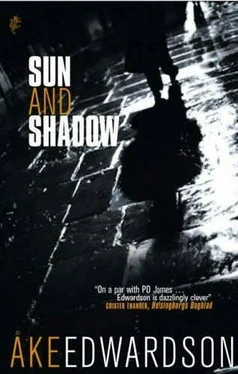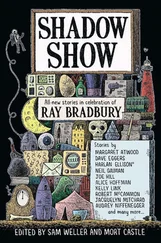Winter phoned Åke Killdén in Fuengirola. No reply. When he put the receiver down the picture inside his head changed. From small whitewashed houses on a roasting-hot slope to glass and steel monsters shooting up through the clouds from a Manhattan he once had a good view of from a twenty-seater airplane as it circled on hold, waiting to land at La Guardia on the other side of the river.
Perhaps they were on the wrong track altogether. No. It was no coincidence that there had been a shop called Manhattan Livs and that it was still there: 150 yards from the seven-story apartment building where the Martells had lived. Not a skyscraper, but the highest building within a mile or so. Three or four miles from the Gothia skyscraper in the center of Gothenburg. Mölndal’s Manhattan: the apartment buildings with their attractive entrances.
There was a key somewhere. But where?
The phone rang.
“It’s Matilda Josefsson,” Mollerstrom said. “She used to work in the minimarket.”
Winter waited for her to be put through. Here she came.
“Er, hello?”
“Detective Chief Inspector Erik Winter here.”
“Yes… I’ve had a message saying that I should get in touch…”
“Good. Can you come to see me?”
“I’ve just this minute gotten home… Will tomorrow do?”
“No, I’m afraid not. I can come around to your place if you’d prefer that.”
“I don’t know…”
“I’ll have my ID on prominent display,” Winter said.
He heard a giggle.
“What’s it about?” she asked.
“We’re investigating some very serious crimes, and we’d like to speak to you about when you worked in a minimarket in Mölndal.”
“Krokens Livs? What’s happened to the old shit-heap?”
“Can I come around in about half an hour?”
“Er… all right. You’ve got my address.”
Winter drove over the bridge. The huge oil tanks glinted, as they always do when the sun is shining. There was a clear view to the west, to far beyond Vinga. The sea was calm, like blue oil.
She lived behind Backaplan. Winter drove past roses growing through the asphalt as he pulled up. He closed his eyes and let his memory of the catastrophe linger there.
Matilda Josefsson was brown-haired and blue-eyed, and about twenty-five. Her apartment was full of heaps of clothes. There was a set of golf clubs in the hall, and a smell of sea and sand in all the rooms. Winter recognized the smell immediately.
“Golf on the Costa del Sol,” she said, without his needing to ask. “I work now and then as a golfing instructor. The high season down there is coming to an end now.”
“Do you know Åke Killdén?” Winter asked, who had sat down on a chair in the kitchen.
“Who?”
“Åke Killdén. He lives down there. Fuengirola. He used to own the shop you worked in. Man-Krokens Livs.”
“I don’t know him. The owner who employed me was called An dersson.”
“Andréasson.”
“If you say so. What did you say your name was? Winter?”
“Yes.”
“There was a Winter who used to play on the golf course I worked for. Las Brisas. That was last season. I remember a Winter. Tall. Elderly gentleman. Bengt Winter. A Swede, of course.”
Winter nodded.
“A relative of yours? Winter isn’t that common a name.”
“He was my father.”
“Really? It’s a small world sometimes.” Then she looked as if she was thinking about what Winter had just said. He was my father.
“When did you finish working at Krokens Livs?”
She was watching him as she replied. She’d noted the rapid change of subject.
“I take any job that’s going when I’m at home,” she said. “As you can tell-I mean, Krokens Livs!”
Winter explained some of the background to why he was there. Asked a few questions.
She’d seen the photograph of Manhattan Livs. But the only thing she could remember clearly as being of any interest at all was when the policeman caught the shoplifter.
“I beg your pardon?”
“There was a police officer in the shop, in uniform, and he caught a shoplifter who was on his way out with a handful of videos. He said he’d forgotten to pay, and, of course, you always believe that!”
“But he was a petty thief?”
“I think he’d stolen a few things before. I recognized him, or at least I think I did.”
“What happened?”
“The police officer asked me if I wanted to make a formal complaint, as he put it. But he looked so wretched… I said no.”
“So you didn’t report him?”
“The officer said he would see to it. The thief had produced his ID card, I saw that.”
“Then what happened?”
“He just showed his ID, sort of.” She held up her hand as a demonstration. “The officer made some notes and then they left and that’s all I know.”
“So you didn’t make a formal complaint?”
“No, like I said. He was going to see to it.”
“Why was he there? This police officer?”
“I can’t remember. I suppose he was buying something. Or renting a video. He’d done that before.”
“So you recognized the police officer?”
“Yes… he’d been in a few times. Sometimes in uniform and sometimes in civvies.”
“Did you talk to him?”
“I did when that shoplif-”
“Any other time, I mean?”
“No, I don’t think so.”
“You don’t know his name?”
“No. Is it important?”
I don’t know, Winter thought. It could be extremely important, or just an everyday occurrence.
“Is it so important?” she asked again.
“Would you recognize this police officer if you saw him again?”
“I don’t know. I’m not very good at faces.”
“You recognized the shoplifter.”
“Yes… because that was different. It was sort of… a crime. I looked at him more than I did the policeman.”
“Did you see the shoplifter again?”
“Not in the shop.”
“But somewhere else?”
“In the street on one occasion, when I was either coming to work or leaving. I suppose he lived nearby. He looked the other way when he saw me.”
“You don’t remember his name?”
“I never heard what it was. The policeman wrote it down.”
“Was there a squad car outside? Did the police officer have a patrol car outside the shop?”
“Good question. No, I can’t remember. But I didn’t look out of the window just then.” She looked Winter in the eye. “Police officers are all the same anyway. Tall, fair-haired. It’s hard to distinguish between them.”
Morelius was on his way to see his mother. The road was very icy.
The traffic got worse as he came to Söderleden, and came to a standstill at the golf club. Idiots in thick anoraks and woolly hats were waiting to tee off and hit balls into thirty-foot snowdrifts.
“This is a surprise,” his mother said.
“I felt like getting away.”
“You’ve lost weight, Simon.”
“Not a lot.”
He noticed the photograph of his father over the piano in the drawing room. He was looking solemn, as always, an expression made more austere by his clerical collar. White against all the black.
He sat in the dark. After last time he thought they might have fitted a new lock, but it was still the same one. Not that it would have mattered.
People passed to and fro. There was a special kind of echo in there. Sounds traveled through the cubbyhole as if along a tunnel, from the noisy stairwell where all hell was let loose when the elevator went up or down and the front door slammed shut. You needed to put your fingers in your ears for that.
Perhaps those were his footsteps out there now. Awkward. Who was in control now, then? Whoever has control now, put your hand up.
Читать дальше












